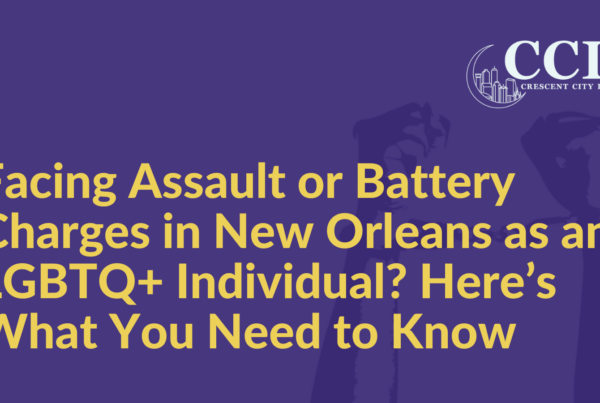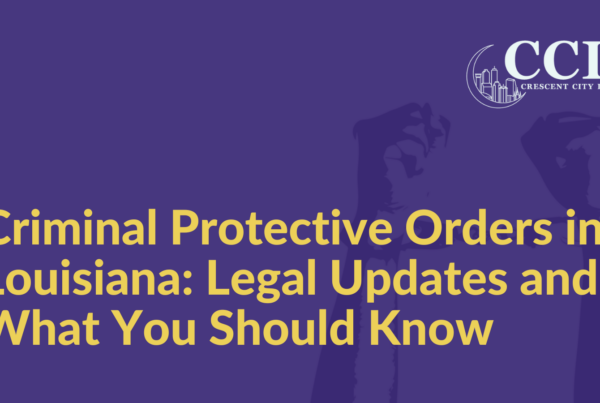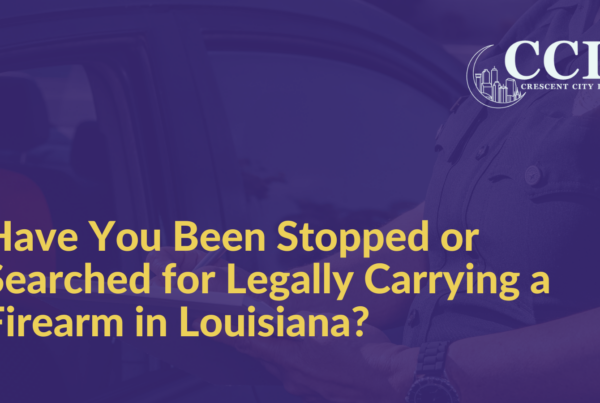From time to time, a criminal defense client who hires our team at Crescent City Law has a warrant out for their arrest.
In these cases, we’ll have to help them be booked into custody, make bond, and then we can defend their case together.
Here’s what that process looks like in New Orleans.
1. Hire Crescent City Law
We won’t be able to help you until we’ve been officially hired as your legal representation.
2. We’ll confirm that you have a warrant out for your arrest.
We usually work with a “friendly” neighborhood police officer to do this since cops are not supposed to check for this information for the public.
To do this, we’ll need the following information from you:
- Name
- Date of birth
- Race
- What you’re being accused of (if you know what it is)?
- Where the arrest warrant is from (which Parish, Police District, or the agency who issued the warrant, etc.)?
(If we are not able to locate a warrant out for your arrest, we’ll let you know. But this doesn’t always mean there isn’t a warrant. We just weren’t able to find one. The only way to be 100% sure there isn’t a warrant for your arrest is for you to attempt to turn yourself in and be turned away by the arresting agency.)
3. We will not do anything about the warrant without your knowledge
As part of your attorney-client privilege, we will not provide your contact information, location, etc., to law enforcement, a judge or anyone else, without your explicit consent (or – in rare cases – an order from the Louisiana Supreme Court).
Instead, we will let you know if there is a warrant for your arrest to the best of our knowledge.
As officers of the court, our attorneys have an ethical obligation to tell our clients of the warrant if they reasonably believe there truly is a warrant and provide legal advice about the benefits and consequences or turning themselves in or not. We are also ethically obligated to tell you to turn yourself in if we have reason to believe the warrant is valid and the warrant is for you.
We’ll let you know where the warrant is from so that you can decide whether or not to turn yourself in after we discuss these potential benefits and consequences.
4. What if you want to turn yourself in?
If you choose to turn yourself in, we recommend that you turn yourself in early in the morning and at the beginning of the week with the goal being able to get out of jail quickly. This way, our team at Crescent City Law will have as much time to get you out as quickly as possible.
We recommend wearing comfortable shoes and clothes, warm socks, no jewelry, and only bring your ID card, some cash, our Crescent City Law business card, and a single debit card when you turn yourself in to be arrested.
Do not bring anything you don’t want to lose or that could further incriminate you.
We charge a flat fee for this service and it must be paid before any work is done to get you out of jail.
5. The Booking Process
The booking process typically includes the confirmation of your identity as the same person as the person subject to the arrest warrant.
When you’re arrested, law enforcement should read you your Miranda rights (“You have the right to remain silent,” etc.) pursuant to the warrant.
You should invoke these rights: Stay silent, request counsel (Crescent City Law), and do not provide any further evidence to the police.
Be prepared: You will be handcuffed and brought to jail, which will be a traumatic experience.
You’ll be “booked” into jail, which includes:
- Getting your fingerprints and mugshot taken
- Providing the agency arresting you with identification information
- Undressing in front of an officer and changing into clothes provided to you
- Turning in your personal belongings
After this process is complete, we can start the process of getting you released.
6. Getting You Released from Jail
We’ll start by reaching out to the appropriate judge, magistrate, or commissioner in your case to secure a bond.
If a bond cannot be set over the phone, our attorney will appear on your behalf at your bond hearing (also known as the “first appearance.”)
Once a bond is set, we will contact your Point of Contact to tell you the bond amount so that your Point of Contact can pay a bond company to get you released.
The average cost of a bond with these companies is between 8-12% of the total bond amount, plus extra fees that the bond company charges (“document fees,” etc.)
Lawyers are prohibited from paying your bond for you.
Once your bond is paid, the bond company will provide the bond to the clerk, who will tell the jail to release you.
Alternatively, you could pay bail, which is when you or your family pay the full bail amount to the court, and the money is refunded at the end of the case as long as you appear in court.
7. Your Release!
Historically, the best turnaround time from arrest to release was 3 hours – but this was for someone whose parent worked for the president of the United States.
For the rest of us, the average turnaround time is about 8 hours, although many people spend 24 hours in jail before being released.
An important note: Under Gwen’s Law, which was passed in 2017, those arrested for domestic violence charges will be held for a minimum of 3 days, exclusive of weekends.
Even though we are your criminal defense team, we have no control over how fast you can be released from jail, so you should be prepared for anything when you turn yourself in.
Contact Crescent City Law today
At Crescent City Law, we understand that facing the prospect of turning yourself in to jail can be an overwhelming and emotional experience. We’re here to provide you with the guidance and support you need to get through this process.
Our experienced team of New Orleans-based criminal defense attorneys is dedicated to protecting your rights and ensuring you receive fair treatment. Don’t face this difficult situation alone. Contact Crescent City Law today.






